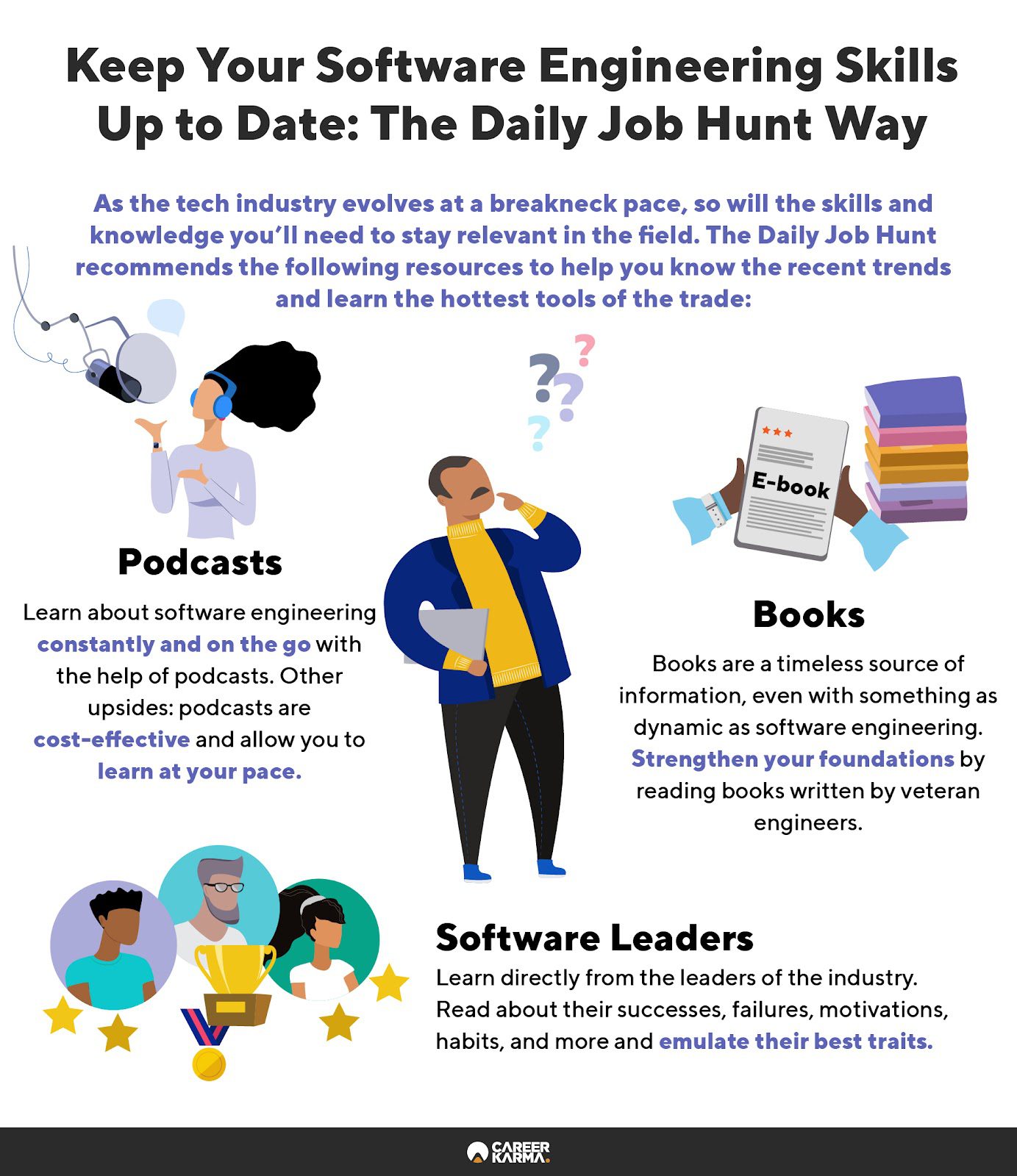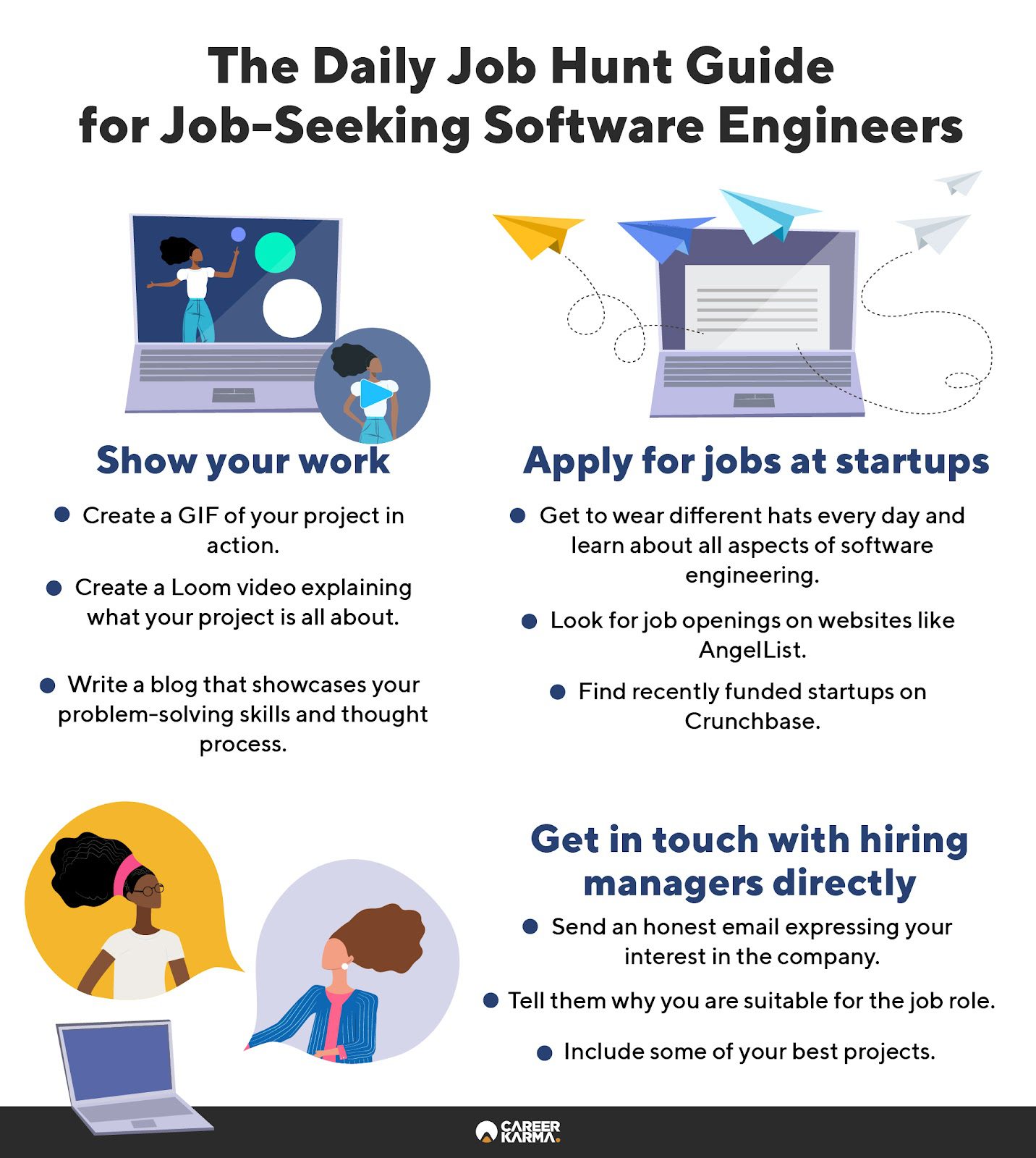Marc Andressen, an American entrepreneur and software engineer, once said, “Software is eating the world.” Every organization faces challenges that can be tackled with the implementation of custom software. Hence, most companies are looking to invest in such technologies, making software engineers extremely valuable, in high demand, and well-paid.
As attractive as a career in software engineering is, the road to a thriving career isn’t so easy. More than knowing how to write lines of code, you’ll also need to develop certain soft skills. You must be able to dig deep into issues, identify solutions, and take action to find or create those solutions. And even after that, you’ll have to face another hurdle: getting the job.
This is where The Daily Job Hunt comes in. The Daily Job Hunt is a career daily email with over 75,000 subscribers worldwide that teaches you how to stand out, build rapport, showcase your work, pitch your ideas, and create custom projects. Hence, it’s a helpful resource for software engineers on the hunt for a new job.
The Daily Job Hunt daily email helps job-seeking software engineers stand out and impress prospective employers by changing their approach to the job search process
Subscribe to The Daily Job Hunt today.Top Software Engineer Skills to Impress Your Employers
According to The Daily Job Hunt, prospective software engineers should develop the following skills:
- Excellent communication skills
- Ability to break down large problems into smaller ones
- A logical approach to problem-solving
- Proficiency in using search engines to find relevant information (Google-Fu)
- Ability to ask insightful questions
- Clear communication skills
- Patience
If you have these skills, you’ll have a better chance of exploring the numerous career paths that the software engineering space offers. You’ll also have the option of specializing in the field that interests you the most, including front end web development, mobile app development, and backend development.
How to Sharpen Your Software Engineering Skills

To succeed in a technical interview as an aspiring software engineer, you will need to constantly expand your knowledge and keep up with current trends and developments in the field. Here are three ways to improve your software engineering skills, as suggested by The Daily Job Hunt.
Learn on the Go with Podcasts
While coding bootcamps and online courses present great opportunities to continue honing one’s software engineering skills, not everyone has the resources and availability that such platforms demand. This is where podcasts come in.
Podcasts offer a more accessible alternative that allows you to learn on the go. All you have to do is pop in your headphones and start listening to the lesson for the day. If you’re looking for more information about software engineering, TDJH advises listening to the following podcasts.
- The Art of Product
- Shop Talk Show
- Syntax
- Full Stack Radio
- The Changelog
- JS Party
Read Every Chance You Get
Reading books on software engineering is inevitable for everyone who wants to launch a career in a tech company. TDJH recommends several books for every aspiring young software engineer.
- Steve Wozniak’s iWoz
- John Sonmez’ The Complete Software Developer’s Career Guide
- Adam Wathan & Steve Schoger’s Refactoring UI
- Rob Fitzpatrick’s The Mom Test
- James Clear’s Atomic Habits
- Paul Graham’s Hackers & Painters: Big Ideas from the Computer Age
Learn from Software Leaders
Ever heard of the tip, “Surround yourself with people smarter than you?” Well, this also applies to software engineers looking to keep their skills sharp. Learn from today’s software leaders themselves and absorb as much wisdom as you can. The TDJH Guide suggests following the software leaders below:
- Yehuda Katz
- Cassidy Williams
- Sara Soueidan
- Sahil Lavingia
- Courtland Allen
- Sarah Drasner
- David Khourshid
- Evan You
How to Hack Your Software Engineering Job Search with The Daily Job Hunt

As mentioned, landing a job as a software engineer takes more than having the right credentials and technical skills. You’ll also need to apply different strategies to stand out. Below are TDJH’s best practices and tips for applying for software engineering jobs as advised by Corné van Straten, a product engineer at Crash.
Show Your Work
Because software engineering involves practical expertise, landing a job in the field takes more than handing out a resume that lists your skillset. This is why most job-seeking software engineers have GitHub profiles where they can show off their projects as well as their collaboration with other software engineers.
However, with the majority of software engineers having resumes and GitHub profiles, it’s easy to still get overlooked by employers.
To differentiate yourself, Corné suggests innovating your application. “Make your projects 10 times more powerful by…recording a little GIF of your project or application in action with a simple tool like LICEcap. Or record a three-minute Loom video where you walk people through your project, what it does, what was hard about it, and what you learned.”
Corné also recommends leveraging other social networking sites like LinkedIn and Medium to show off your thought process. “Write a blog about a technical problem you encountered, how you ended up solving it, and what you learned in the process… Make sure to include code snippets in your solutions.”
“[These strategies] make it a lot easier for potential employers to consume and gauge what you made than having to dig through your code on GitHub…Remember that most job hunters aren’t doing anything like this. They’re just presenting themselves as a one-page PDF and a GitHub profile. That’s pretty easy to top if you’re willing to do a little extra work.”
Apply for Jobs at Startups
While it’s easy to get swept up by the idea of working in today’s top tech companies, TDJH cautions applicants from discounting the FAANGs of the future: startups. Indeed, working for a startup has many benefits.
First, it is a lot easier to get hired by a startup. “FAANG and other big corporations have thousands of people knocking on their door every day. And so they standardized their entire hiring process into its own bureaucracy… Startups are a lot easier to get into. If you do some work to find your future boss’s email address, and you send them a cool pitch with some proof that you would be a really valuable addition to their team, chances are you’re getting a callback,” advises Corné.
Second, you will have more opportunities to work on actual programs and get to wear several hats every day instead of just working on one aspect of the company. “You’re going to learn very quickly in your first role, which also makes this first job a great springboard into future roles or jobs at different companies,” says Corné.
Corné recommends searching for job listings on websites, such as the AngelList. “Better yet, find the company you want to work for before they even get around to writing job listings by searching on Crunchbase for recently funded startups.”
Contact the Hiring Manager Directly
You don’t always have to tick all the boxes at a job posting before you can apply for the job. If you think you have the skills to take on the job, pitch yourself and go directly to the hiring manager.
“Find the hiring manager’s contact information, and send them a real, short but genuine email, in which you show interest in the company. Tell them why you love what they do, why you’d be a good fit, what kind of value you can bring to the table,” says Corné, noting that there’s an added value to supporting your application with projects and endorsements from former colleagues.
Change Your Job Hunting Mindset with TDJH
The Daily Job Hunt encourages job seekers to take initiative and think outside the box. Reach out to real people, find opportunities where no one else is looking, apply to companies that don’t even advertise their job openings, and actively pitch yourself.
Want to hear more tips on how you can stand out in search of your dream software engineering job? Subscribe to The Daily Job Hunt daily email today.
About us: Career Karma is a platform designed to help job seekers find, research, and connect with job training programs to advance their careers. Learn about the CK publication.




